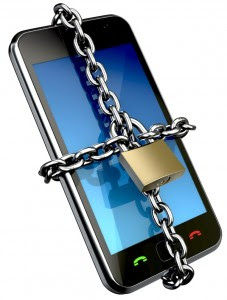Mobile phones have become one of the primary ways people communicate. You can instantly talk to or message anyone else around the world. In addition, with the development of smart phones you can now carry the power of a computer in your pocket. However, with all this tremendous power, it also brings security risks. One in 63 Smartphones are infected by Mobile Spyware and Malware. Following are the top five steps for safely using mobile phone.
Solution:
Solution:
1. Passcodes. In case your Mobile is lost or stolen, anyone can recover all of your private information, including emails, SMS messages, contact list and even your movies and photos. To protect yourself, be sure you lock your mobile phone with a password or passcode.
2. SMS Phishing. Cyber criminals send SMS messages pretending to be an organization you trust, such as your bank. They exploit this trust to get what they want. These messages are lies designed to trick you into giving your information, do not trust any message that asks you for your personal information.
3. Bluetooth: You must be careful how you setup Bluetooth. Be sure to enable Bluetooth only when you need it. In addition, make sure your phone is configured not to be discoverable. This is especially important when you are traveling in public places, such as airports, hotels or restaurants.
4. Applications: Mobile devices these days combines the functionality of a phone with the power of a computer. Because of the complexity of smart phones, they share many of the same risks as computers. Just as with a computer you must be sure you install, configure and use your applications securely.
2. SMS Phishing. Cyber criminals send SMS messages pretending to be an organization you trust, such as your bank. They exploit this trust to get what they want. These messages are lies designed to trick you into giving your information, do not trust any message that asks you for your personal information.
3. Bluetooth: You must be careful how you setup Bluetooth. Be sure to enable Bluetooth only when you need it. In addition, make sure your phone is configured not to be discoverable. This is especially important when you are traveling in public places, such as airports, hotels or restaurants.
4. Applications: Mobile devices these days combines the functionality of a phone with the power of a computer. Because of the complexity of smart phones, they share many of the same risks as computers. Just as with a computer you must be sure you install, configure and use your applications securely.
- Only install applications you absolutely need. The more applications you install, the more likely one of them has a vulnerability, exposing you and your information to danger.
- Only install well known applications from trusted sources.
- Never install applications advertised by SMS messages.
- Once you install applications on your smart phone be sure they are configured securely.
5. Updating: Just like your computer, one of the most important steps to securing your phone is ensuring that it is always running the latest operating system. In addition, ensure that any applications you have installed are current. Be sure to update your phone at least once a month.
Disposing Your Mobile:
Many people replace their mobile phones almost every year. Before you dispose your mobile phone make sure to:
Disposing Your Mobile:
Many people replace their mobile phones almost every year. Before you dispose your mobile phone make sure to:
- Delete all the data on your phone (such as photos, contact information, phone call records, SMS messages, etc).
- Then overwrite this information with very large files (such as movies). Then delete the large files you just installed.
This process will ensure your information is securely destroyed


0 comments:
Post a Comment